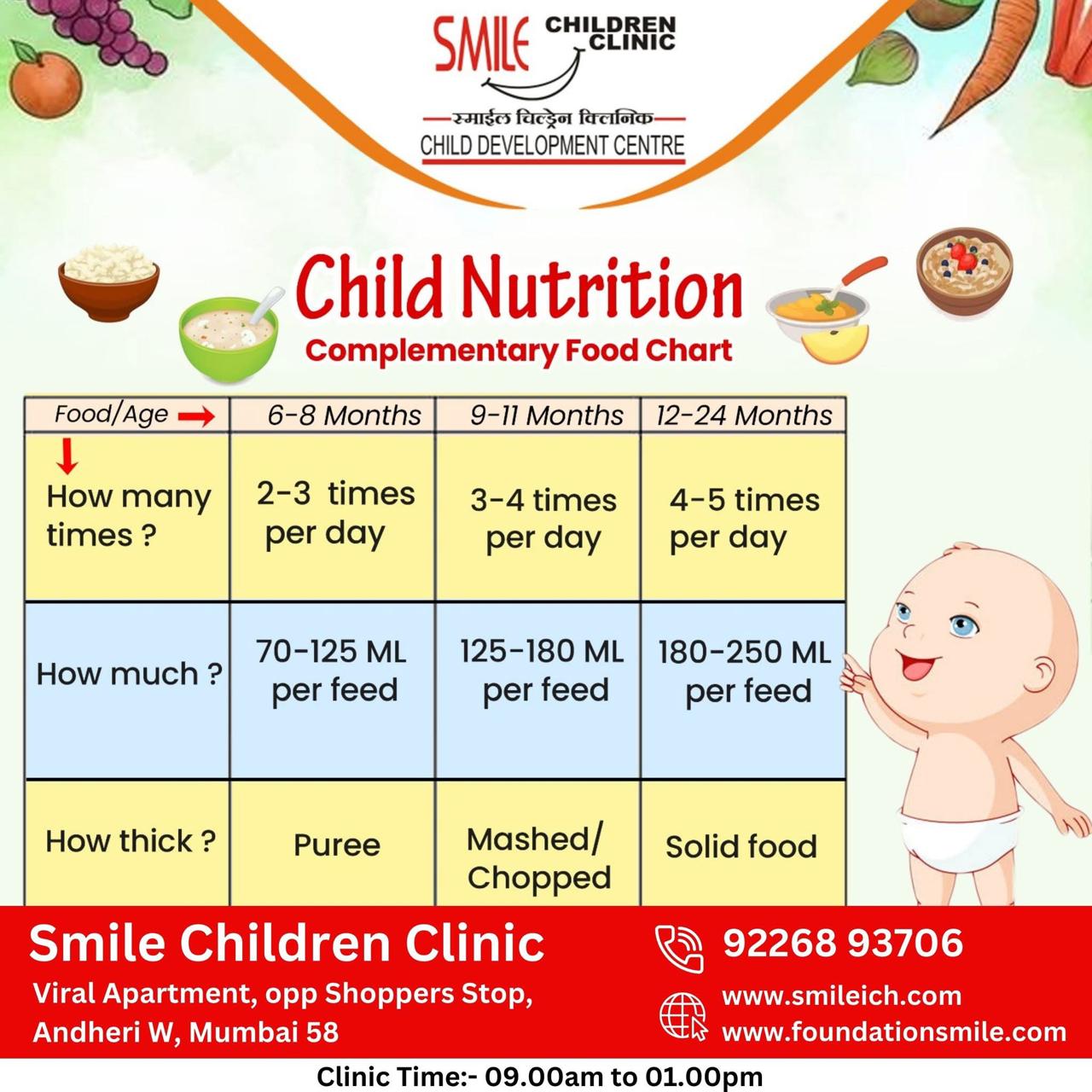
Why Child Doesn’t Eat?
Clinic for underweight kids and fussy eaters
If you're in Andheri, Juhu, Vile Parle, Jogeshwari, Santacruz area and wondering why your child doesn’t eat well, Smile Children Clinic is here to help. We evaluate, diagnose and treat children who are not gaining weight, who have poor appetite, who always refuse to eat, and those children whose growth is less than normal.
1. It’s Often Normal—and Not Always a Problem
Many toddlers eat less than expected—not due to lack of hunger, but because their growth rate slows after infancy. At Smile Children Clinic, experienced paediatricians often see that, sudden head-turning away from food or stopping meals around 1–2 years is typical: digestion and growth slow, and food needs decrease. This is a normal phase, not necessarily underweight. We chart the growth of every child and let you know if the child is growing well, in which case there is no need to investigate further.
2. Different Causes of Poor Appetite
A. Picky or “Choosy” Eating
Paediatricians see this "picky eater" behaviour which is common between ages 2–4 years and usually lasting for some duration. Children might enjoy only a few foods, resist new ones, or pick foods by texture or colour.
B. Sensory issues
Some children find textures or tastes overwhelming, and our children specialist doctors often see this linked to sensory traits like heightened sensitivity to certain textures like slimy, rough etc.
C. Underlying Disorders
Children with anxiety, ASD, ADHD, or depression struggle more with eating. In severe cases, a medical condition called Avoidant Restrictive Food Intake Disorder (ARFID) may be involved.
D. Disordered Eating Patterns
What may seem like picky eating can sometimes be more serious feeding disorders which are marked by gagging, refusal, or failure to thrive.
E. Environmental & Cultural Influences
In India, children often prefer calorie-rich, sweet, or processed foods while rejecting vegetables due to early life experience, culture, familiarity, advertising, peers, and home environment.
3. How Common Is It—and When to Worry?
Globally, picky eating affects 25–50% of young children and remains in 15-20% into later childhood. Our experience at Smile Children Clinic is that 60% of primary school kids are picky eaters. Most outgrow it—but stubborn pickiness, limited diet, weight loss, or social/physical issues require paediatrician’s attention.
4. Effective Strategies for Parents
Here is the list of advice from Expert Paediatricians in Andheri:-
- Family-style meals: Eat together without TV or screens; serve everyone the same food. Talk about anything on and outside earth except eating food! Make (and self-scrutinise it repeatedly) mealtime a happy time to look forward to and that too from child’s angle.
- Avoid pressure, coercing, distracting or bribes: Overemphasis can worsen refusal.
- Consistent schedules: Regular meals and healthy snacks not earlier than 3 hours help appetite. Let children not eat anything in 2 hour window preceding meal or snack time.
- Repeated exposure: It may take 15–20 tastings before acceptance, so be patient.
- Involve your child: Let them help shop, choose recipes, and help out in kitchen in small ways, kids are more likely to try what they help make.
- Model adventurous eating: Parents, siblings trying varied foods encourages children.
- Balance nutrients: Incorporate proteins, whole grains, fruits, and veggies—especially in snacks.
- Address sensory issues gently: Use gradual, no-pressure sensory exposure for texture-sensitive kids.
- Make the plate colourful and infuse some fun by various shapes and colours!
- Separate out ministries and portfolios between you and child, and don’t interfere in each other’s portfolios! When to eat, what to eat and where to eat is up to parents, how much to eat and whether to eat or not is up to kids.
5. Parenting Styles is important
Authoritative parenting which is warm but firm, produces better eating habits. In contrast, authoritarian control or permissive styles often lead to more picky eating.
6. Our experience of last 37 years of paediatric practice:
Our children often prefer sweet, processed items over vegetables and fruits—a consequence of family food ambience, peer pressure, school environments, and aggressive advertising. Parents are over concerned. Very few paediatricians plot and fill growth charts. Parents only take their kids to children specialists when kids are ill, so paediatricians often find it difficult to focus on child growth, child nutrition and dietary habits.
7. When should I visit Paediatrician at Smile Children Clinic?
- Your child shows weight loss or falls down growth percentiles
- Mealtimes trigger daily stress or conflict
- They refuse entire food groups or textures persistently
- Physical symptoms like vomiting or choking occur
- Appetite issues continue beyond typical picky eating phases
- If really concerned, visit when child is not ill for complete evaluation
8. What Child Specialist do at Our Clinic?
- Comprehensive evaluation: growth charts, dietary history, feeding behaviour.
- Screening: for underlying medical, sensory, or psychological factors.
- Treatment: combining nutritional guidance, feeding techniques, and family education, including grandparents!
- Follow-up support: tracking progress and adjusting approach.
